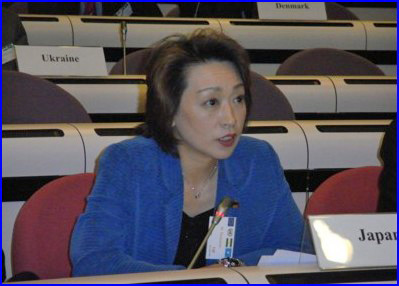Statement by Ms. Seiko Hashimoto, State Secretary for Foreign Affairs of Japan
at the International Conference in Support of the Somalian Security Institutions
and the African Union Mission in Somalia (AMISOM)

The International Conference in Brussels on the 23rd of March in support of the Somalian Security Institutions and the African Union Mission in Somalia (AMISOM), hosted by the European Commission, was co-chaired by the United Nations Secretary General Ban Ki-moon and the African Union Chairman Jean Ping, in the presence of the President of Somalia, Sheikh Sharif Sheikh Ahmed, the President of the European Commission José Manuel Barroso and Commissioner for Development and Humanitarian Aid, Louis Michel.
The aim of the conference was to raise funds to finance the Africa peacekeepers and Somalian security forces. in a state that has functioned without a central government since 1991 and has suffered enormously with conflict.
Ms. Seiko Hashimoto, State Secretary for Foreign Affairs of Japan, made a statement:
"We have all been aspiring for the stability of the situation and the realization of a sustainable peace in Somalia for many years. This is the issue that the international community must address through concerted efforts, as they will also contribute to the fundamental resolution of the current pending issue of piracy off the Somali coast. I would like to echo previous speakers this morning in this regard, that we should provide strong support for the efforts of the Transitional Federal Government (TFG) of Somalia headed by President Sheikh Sharif Sheikh Ahmed and engage in the greatest possible efforts towards the attainment of future stability and peace in Somalia.
In Somalia, which is in an extreme state of instability, ensuring security is the absolute priority, both to enable smoother implementation of humanitarian activities, which currently face limitations on their access, and also to promote full-fledged recovery and reconstruction in the future. Japan therefore considers holding of this Conference to discuss the measures towards such goals to be extremely opportune as well as realistic in its approach. I would like to commend the efforts of United Nations Secretary-General Ban Ki-moon for taking the initiative, as well as the efforts of the other co-chairs and relevant parties including the AU and the EU.
Last month in Botswana, Japanese Foreign Minister Hirofumi Nakasone met with Minister for National Planning and International Cooperation Abdirahman Abdishakur Warsame of the TFG to hear directly the urgent issues now facing Somalia.
Japan’s recent assistance through international organizations with a view to contributing to the stabilization of the situation in Somalia includes humanitarian assistance to refugees and internally displaced persons, as well as assistance to improve security. Specifically, Japan’s humanitarian assistance has included aid in the areas of food, health, water and sanitation, and education, while its security-related assistance has included measures to counter human trafficking and irregular migration, strengthening of border management, support for the Somali police, and planning for the collection and destruction of small arms and light weapons in the Horn of Africa region, among other efforts. Japan’s assistance over the past two years comes to approximately US$67 million in total.
In the United Nations, the Secretary-General's report has recently been submitted to the Security Council on the basis of Security Council Resolution 1863, recommending that an incremental approach be taken with regard to the deployment of a United Nations peacekeeping operation in Somalia. The Council will consequently give consideration to forthcoming actions. It is important to hold comprehensive discussions at the Security Council, particularly regarding the nature of United Nations assistance intended to achieve strategic goals in the areas of promoting the political process, enhancing security, and implementing reconstruction assistance. Japan intends to contribute proactively to these discussions. As for the potential deployment of PKO, given the current situation, Japan’s position is that it would be appropriate for the time being to pursue a further strengthening of AMISOM and capacity building of Somali security institutions, while carefully monitoring and assessing the local political and security situation.
In light of this recognition of the current situation, Japan will continue to extend assistance that contributes to stabilization of the situation and the promotion of peace in Somalia, in addition to recent assistance described earlier. Japan is currently considering extending an appropriate amount of assistance towards the strengthening of AMISOM as part of the augmenting of countermeasures against piracy occurring off the coast of Somalia and in the Gulf of Aden, which are important sea lanes connecting Japan with Europe and the Middle East. Moreover, Japan is seriously examining providing support to improve access for humanitarian assistance and also to ensure that Somali youth have legitimate means of earning a livelihood other than piracy.
With regard to capacity building of the coast guards of neighboring countries as an important means of combating piracy, Japan has conducted training for personnel of Yemeni and Omani maritime security-related institutions, and currently, Japan is dispatching study missions to Yemen and Djibouti to identify further cooperation to enhance both maritime security capabilities and economic and social development in these two countries. Japan is also moving forward with preparations for the dispatch of P-3C patrol aircraft, in addition to its Maritime Self-Defense Force vessels currently operating in the area. Furthermore, the Japanese Diet is at present deliberating an Anti-Piracy Measures Bill that would penalize piracy and stipulate measures against it.
Japan hopes to engage in meaningful discussions with the other distinguished participants at this Conference so that concrete outcomes emerge with regard to how to ensure security in Somalia, which will form the basis for its stability and peace. Moreover, Japan ardently hopes that on that basis, momentum will be gained in the near future for the convening of an international conference to discuss Somalia’s broader development and reconstruction needs, including state institution-building and improving people’s quality of life, among other issues. I would like to close my statement today by emphasizing that Japan is willing to engage in close cooperation with the Transitional Federal Government of Somalia and also with relevant countries and organizations towards that end."
